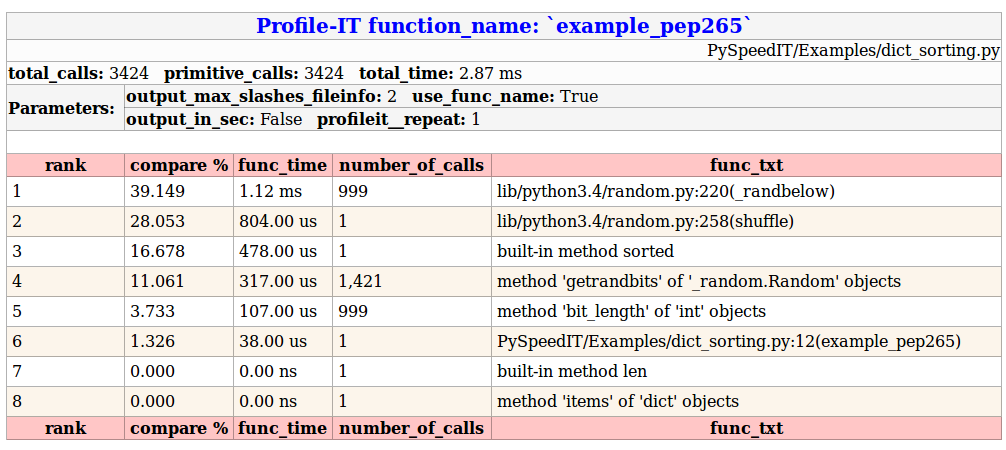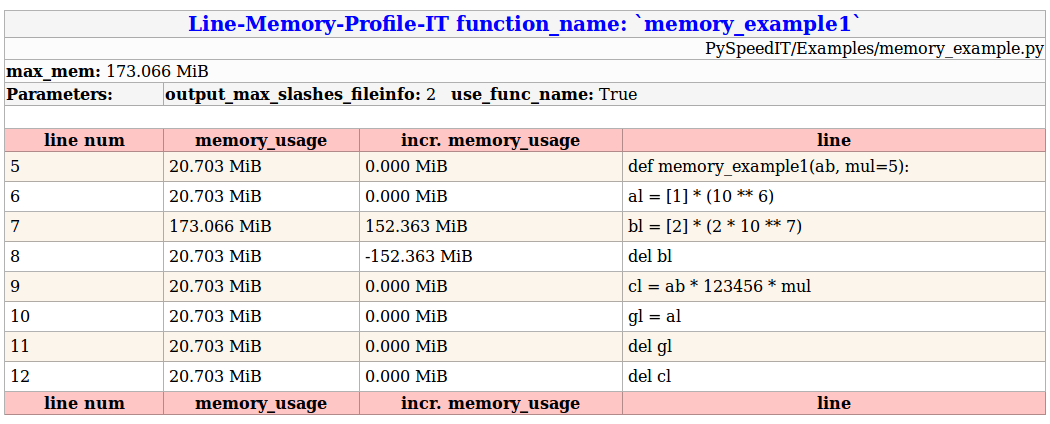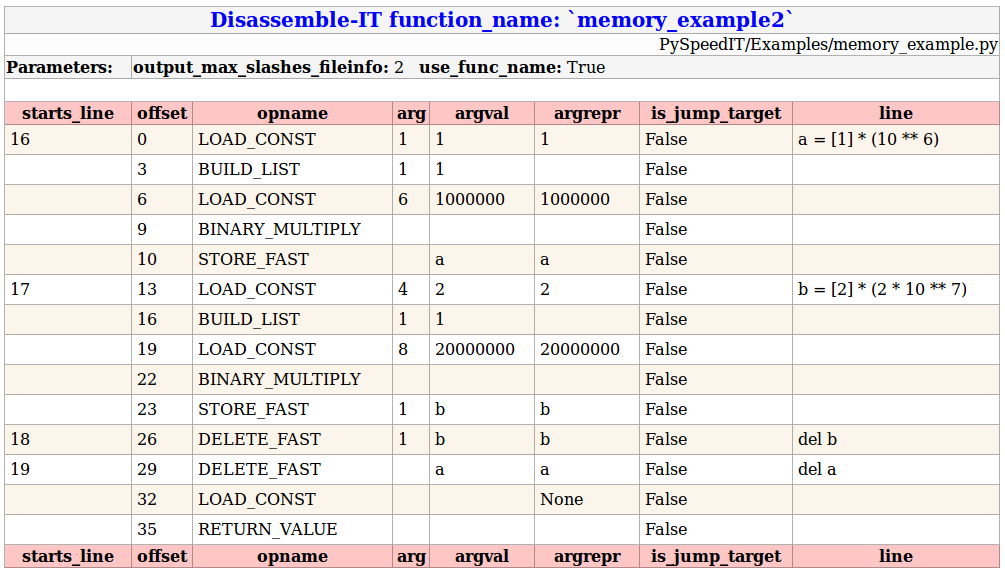PySpeedIT.speed_it¶
Overview¶
This is the main module of PySpeedIT. It is a combination of Benchmark-IT, Profile-IT, Line-Memory-Profile-IT, Disassemble-IT.
Speed-It-Usage¶
Define one or more separate modules with test functions.
Python-Example
# file: usage_example.py from operator import itemgetter from random import shuffle def _outer_helper(y_): return y_[1] def example_pep265(data_): shuffle(data_) result = sorted(data_.items(), key=itemgetter(1)) del result def example_formal_func_outer(data_): shuffle(data_) result = sorted(data_.items(), key=_outer_helper) del result # for Benchmark-IT subcode_blocks def example_multiple_subcode_blocks(): # ::SPEEDIT:: data data = dict(zip(range(1000), range(1000))) # **SPEEDIT** shuffle(data) # ::SPEEDIT:: sorted result = sorted(data.items(), key=itemgetter(1)) # **SPEEDIT** del result def memory_example(): a = [1] * (10 ** 6) b = [2] * (2 * 10 ** 7) del b del a
Define an other module to run Speed-IT.
Python-Example
# file: run_speed_it __usage_example.py # Import abspath from os.path import abspath as path_abspath # Import speed_it from PySpeedIT.speed_it import speed_it # define any needed extra variables to use as arguments data = dict(zip(range(1000), range(1000))) # ++++++++++++++++++++++++++++++++++++++++++++++++++++++++++++++++++++++ # def main(): # defining the: modules_func_tuple mapping modules__func_tuples = ( # TUPLE format: # [module_path_str, ( # (name_str, function_name_str, list_of_positional_arguments, dictionary_of_keyword_arguments) # )] [path_abspath('usage_example.py'), ( ('sorting: pep265', 'example_pep265', [data], {}), ('sorting: formal_func_outer', 'example_formal_func_outer', [data], {}), ('multiple_subcode_blocks', 'example_multiple_subcode_blocks', [], {}), ('memory_example', 'memory_example', [], {}), )], # any other module: a similar list )
Note
Do not import the module with the functions to speed-it: the module is internally loaded from file
For more examples see any files in the PySpeedIT source SOURCE/Examples
- especially the file: run_speed_it.py
Common Errors¶
Return statement in speed_it functions¶
Function which are used for speed_it may not have a return statement because they may run in a loop
Python-Example
WRONG return statement
# helper function is ok to have return statement
def recip_square(i_):
return 1.0 / (i_ ** 2)
# function to be used by speed_it can not have a return statement
def approx_pi(n_=100000):
val = 0.
for k_ in range(1, n_ + 1):
val += recip_square(k_)
return (6 * val) ** 0.5
Missing speed_it modules__func_tuples arguments¶
If a function defines a default argument it still needs an argument passed on in the modules__func_tuples.
Python-Example
# function to be used by speed_it
def approx_pi(n_=100000):
val = 0.
for k_ in range(1, n_ + 1):
val += recip_square(k_)
return (6 * val) ** 0.5
WRONG: modules__func_tuples missing argument for : n_
modules__func_tuples = (
[path_abspath('calculate_pi.py'), (
('calculate pi', 'approx_pi', [], {}),
)],
)
OK: modules__func_tuples with argument for : n_
modules__func_tuples = (
[path_abspath('calculate_pi.py'), (
('calculate pi', 'approx_pi', [], {'n_': 100000}),
)],
)
Screenshots of OUTPUT HTML¶
Benchmark-IT OUTPUT HTML¶

Profile-IT OUTPUT HTML¶

Line-Memory-Profile-IT OUTPUT HTML¶

Disassemble-IT OUTPUT HTML¶

Functions¶
- PySpeedIT.speed_it.speed_it(html_output_dir_path=None, enable_benchmarkit=True, enable_profileit=True, enable_linememoryprofileit=True, enable_disassembleit=True, modules__func_tuples=None, output_max_slashes_fileinfo=2, use_func_name=True, output_in_sec=False, profileit__repeat=1, benchmarkit__output_source=False, benchmarkit__with_gc=False, benchmarkit__check_too_fast=True, benchmarkit__rank_by='best', benchmarkit__run_sec=1, benchmarkit__repeat=3)¶
Writes the results per defined module to html files overwriting them if they existed.
Parameters: - html_output_dir_path – Base directory to output the results
- enable_benchmarkit – enable/disable Benchmark-IT
- enable_profileit – enable/disable Profile-IT
- enable_linememoryprofileit – enable/disable Line-Memory-Profile-IT
- enable_disassembleit – enable/disable Disassemble-IT
- modules__func_tuples –
(tuple) TUPLE format:
Python-Example
[module_path_str, ( (name1_str, function1_name_str, list_of_positional_arguments, dictionary_of_keyword_arguments), (name2_str, function2_name_str, list_of_positional_arguments, dictionary_of_keyword_arguments), ]
# defining the: modules_func_tuple mapping modules__func_tuples = ( [path_abspath('calculate_pi.py'), ( ('calculate pi', 'approx_pi', [], {}), )], [path_abspath('dict_sorting.py'), ( ('sorting: pep265', 'example_pep265', [data], {}), ('sorting: stupid', 'example_stupid', [data], {}), ('sorting: list_expansion', 'example_list_expansion', [data], {}), ('sorting: generator', 'example_generator', [data], {}), ('sorting: lambda', 'example_lambda', [data], {}), ('sorting: formal_func_inner', 'example_formal_func_inner', [data], {}), ('sorting: formal_func_outer', 'example_formal_func_outer', [data], {}), )], )
- output_max_slashes_fileinfo –
(int) to adjust max path levels in the module file info
(as well the Profile-IT func_txt)
- use_func_name –
(bool)
- if True the function name will be used in the output name
- if False the func_dict key will be used in the the output name
- output_in_sec –
(bool)
- if true the output is kept in seconds (float)
- if false it is transformed to:
Orders of magnitude (time) Name Symbol Definition second ( s ) One second millisecond ( ms ) One thousandth of one second microsecond ( µs ) One millionth of one second nanosecond ( ns ) One billionth of one second
- profileit__repeat –
(int) how often the function is repeated: the result will be the sum of all: similar to the code below
for repeat in range(profileit__repeat): profiler.enable() profiler.runcall(func, *func_positional_arguments, **func_keyword_arguments) profiler.disable()
- benchmarkit__output_source – (bool) if True a text file is written with the actual Benchmark-IT code used
- benchmarkit__with_gc –
(bool)
- if True gc is kept on during timing
- if False: turns off garbage collection during the timing
- benchmarkit__check_too_fast –
(bool)
- if True and a code block is executed faster than a Reference-Time an Exception is raised.
- Reference-Time: the smallest difference of calling perf_counter() immediately after each other a couple of times
SeeAlso
- if True and a code block is executed faster than a Reference-Time an Exception is raised.
- benchmarkit__rank_by –
(str) best, average or worst
..important:: worst uses also the best loop time but ranks the worst one as: base 100%
- benchmarkit__run_sec –
(float or -1)
- the number of loops per run is scaled to approximately fit the benchmarkit__run_sec
- if benchmarkit__run_sec is -1: then the generated function source code is only run once
- benchmarkit__repeat –
(int) how often everything is repeated
- This is a convenient variable that calls the whole Benchmark-IT setup repeatedly
